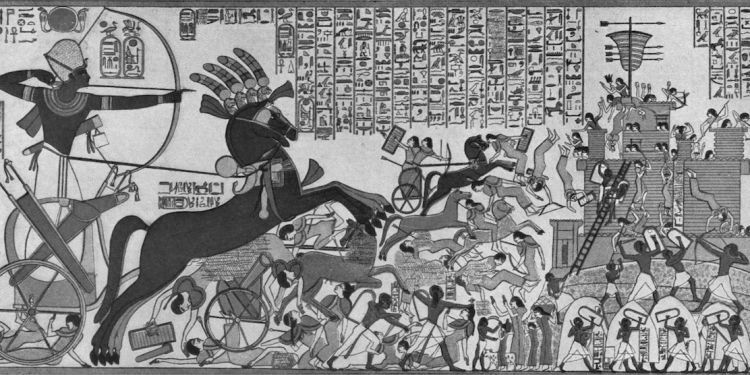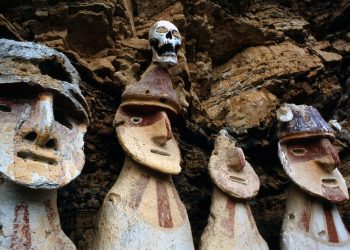When it comes to forming the new world and the events that changed modern history, people don’t always consider the seriousness and the importance of historical events before the beginning of the new millennia.
It has to be accepted that the events during the ancient world, mainly because we don’t have enough sources to evaluate them, have been disregarded and dismissed for a long time.
This article is here to raise awareness of battles that have been so legendary and historical that although they took place 2,000 years ago, they had a significant impact on today’s world and the way events turned out.
Another critical point that has to be addressed before the beginning of the analysis is that this is a complete perspective and perspective of the writer.
You are more than welcome to disagree, but throughout the article, I believe that I make a good case on why the battles I chose deserve to be on the list due to their contemporary vitality and importance.
Another important takeaway is that the actions are in chronological order, but this isn’t grading them most to the least important.
-
Battle of Thermopylae (480 BC)
The Battle of Thermopylae took place during one of the most destructive but essential wars of the ancient period; the Second Persian War. This was the second phase of the Greek-Persian wars, and after the people of Persia, under the auspices of Darius, lost to the Greeks, Xerxes came back to invade Greece and take revenge for the loss of his father.
Although the Persians had one of the most diverse militaries the world had ever seen, the Greeks were known for their ruthless spirit and the powerful unity between the alliance of Athenians, Spartans, Plebeians, and other smaller communities.
Nonetheless, during the battle, King Leonidas of Sparta knew that the Greeks would lose at this point, and considering the enormous enemy of the Persians and the small road of Thermopylae, the projected outcome of the events would be a loss for the Greeks.
Although there were 7,000 Greeks in Thermopylae initially, Leonidas understood that it was impossible to beat the Persians. Therefore, he ordered that only 300 Spartans continued to fight in the battle and sacrifice themselves, so the rest of the Greeks could retreat and protect the country.
This is one of the most critical paths and battles for the Spartans and a historical event that solidified themselves as the most ruthless and, at the same time, glorious communities in ancient history.
-
Battle of Kadesh (1274 BC)
When it comes to the battle of Kadesh, a historian would be talking about an event that took place more than 3 millennia ago but, this was what solidified the Egyptian civilization and culture. In a battle between the New Kingdom of Egypt and the Hittite Empire, Ramesses II was called to march in the north of today’s Syria since he had a plan to extend the empire’s territory.
The Battle of Kadesh is referred to by many as the oldest battle to have ever been recorded; the Egyptians outnumbered the 20,000 Hittites by 10-20 thousand men (the numbers aren’t accurate due to the battle date). Although at the beginning Ramesses had understood that he couldn’t pull it off with the army that he already had, after a while, he called the remainder of the Egyptian military and successfully attacked the division of Muwatalli II.
Hadn’t it been for the success of this attack, it would be hard to talk about the Egyptians as one of the most influential societies in the history of the world.
-
Battle of Gaugamela (331 BC)
In a continuation of the Greek-Persian wars, the Macedonian empire expanded drastically over the ancient Mediterranean map. At this point, it wasn’t on the defensive but the offensive side of the spectrum against the Persians. To be more specific, Alexander the Great had dominated most of the East Asia territory, and one of the most vigorous opponents was the Achaemenid empire, the Persians.
This wasn’t only a win that would assert Alexander’s dominance forever, but it also put him on the list for the most outstanding military leaders of ancient times. Still, it was also a way of showing that the smaller army can actually change the war’s outcome.
Obviously, the army of Alexander and the Macedonians weren’t as many as the Persians, but they were more effective. That’s why the military strategies and the tactics in the battle of Gaugamela were also used in the contemporary context.
Lastly, this battle ended the Achaemenid empire. Although this was the loss of Leonidas as a glorious battle, this might be the most important for the Greeks seeking revenge and Alexander, who wanted to end this story.
-
Battle of Gaixia (202 BC)
One of the most disregarded empires in antiquity during BC is the one that developed in the Chinese territory, shortly before the beginning of the new millennium.
In addition, however, the most important name of this particular period was the Han dynasty, and it all started in the battle stated above. This was a battle between the Han and the Western Chu. Xiang You was the leader of the Western Chu while and Liu Bang was the commander of the enemy.
The battle took place in the present-day territory of Suzhou in Anhui, and the supremacy of the Han army crushed the military of Xiang You. 600,000 Han men had to face 100,000 troops of the enemy. The battle isn’t important only for the dominance of the Han, but for the beginning of a new era in the Far East Asian region that would develop a powerful place for the rest of history.
-
Battle of the Hydaspes (326 BC)
This battle is more of a personal choice for this article, and I will explain why shortly.
This is a battle that took place while the campaign of Alexander the Great was approaching its own end, and it was a battle between the Macedonians and the Hindu Paurava Kingdom; in other words, the Indians. Any question of the form “but why did you choose this one over another glorious conquest of Alexander” would be justifiable, and I would be happy to answer shortly.
In reality, this was more of a future and long-term loss for the Macedonians and the end of the campaign. That’s because this was the most challenging win to be awarded to the Macedonians, and many historians have called it the most costly win for the army of Alexander.
That’s not only due to the power of the Indians but also due to the exhaustion of the Macedonian military; Alexander took pride in his win and continued to expand, even though the army was far from able to continue.
The victory is the beginning of the end for arguably the most extensive campaign of the ancient world by a single man, and that’s because the cost of the war was a sign that Alexander would dismiss and would lead to the most significant issues Macedonian empire had ever come across.
-
Siege of Syracuse (213-212 BC)
This is one of the most crucial battles for the Roman republic, and there’s no question that the country of Rome wouldn’t have built such a strong empire if it wasn’t for this victory.
More specifically, this was a period of rising in the republic, and one of the most solid enemies was the Hellenistic empire. However, the Syracuse city was dominated by the Carthaginians, the people of Phoenician descent that had established control in the region during the First Punic War.
The Siege of Syracuse was a military expansion that took place during the Second Punic War, and the Romans, led by Marcus Claudius Marcellus, laid siege to the ports of Sicily in 213 BC.
Once again, the Roman republic was in the early stages of dominating the Mediterranean world, and that’s why it didn’t really have a stronger army than the Syracuse defenders. Still, the Romans managed to conquer Sicily and make it one of the most important places for the cultural and social influence of the Romans.
-
Battle of Carrhae (53 BC)
Moving on to a battle among the darkest pages in the Roman history book, we have the Battle of Carrhae and the Romans against the Parthians. This was a battle that took place around present-day Turkish territory, and it stemmed from the urge of the Romans to extend the empire even further.
One of the most important things to consider is that the Roman administration was still managing the power as a republic. The expedition leader was one of the three men taking part in the First Triumvirate, Crassus.
The Romans were unable to penetrate the defensive forces of the Parthians, and now they had stronger enemies in Asia. Up until this point, they only had issues with the Carthaginians in the Mediterranean, but more and more communities were getting powerful. This signified that the Roman Republic wouldn’t continue to dominate every place they fought in easily.
Still, it also took a hit in the inner republic. With the death of the leader Crassus, the administration of the First Triumvirate was over, and historical accounts have shown that Crassus was the man who united the other two, Caesar and Pompey. That’s why they actually turned against each other after his death and didn’t even think of continuing his vision peacefully.
After the loss in the battle and the death of Crassus, tensions between Caesar and Pompey quickly escalate, and the Roman Republic witnessed a civil war. Suddenly, we have the fall of the roman republic, which was saved by Marcus Aurelius, and the creation of the empire. This battle impacted the Roman Empire for centuries to come, but this is what the Romans got for always trying to dominate more communities and more citizens across the globe.
-
Third Servile War (73 BC)
This is an interstate battle that is of utmost importance, and even though it doesn’t involve enemies or different powers, it’s still crucial and has to be understood. More specifically, this is the Third Servile War, a conflict between the administration and their authorities of the Roman Empire against an army of slaves trying to escape oppression and slavery.
In more of a backstory, the whole system of Rome since the beginning of the empire was based on slavery and the harsh treatment of people that were servants. One of the most challenging things in the kingdom was to flee slavery.
That’s why, around the years of the growth in the Roman Empire and towards the beginning of the century, more than 100,000 slaves tried to rebel against the forces of the Roman Empire. There have been many previous efforts from the slaves to fight for their liberty but this one was the most important and showed the enemies outside of the Roman Empire that nothing was as perfect as it seemed inside Rome.
Regardless of the number of the slaves and the fact that they outnumbered the Roman army, the military powers had better organization and resources, which led to a decisive Roman victory and the punishment of the slaves.
-
Battle of Metaurus (207 BC)
Although the previous points have analyzed a conflict between the Romans and the Carthaginians in the Siege of Syracuse along with its importance as a way of building the empire in the Mediterranean, it’s more than vital to take into account another crucial battle with the Carthaginians; the Battle of the Metaurus in 207 BC. The events of this battle don’t have as much significance as the importance of the people involved, especially the leaders.
The win of the Romans came from the superiority of the forces, but you should pay attention to the fact that this was the first time that the Romans had faced such intense adversity, and that’s only due to one man: Hannibal.
Hannibal is honored as one of the most efficient military leaders who managed to dominate the Roman Empire. Although accounts show that he lost the battle due to his brother being trapped and unable to get him any resources, his strategies pushed the burden even more. Historical accounts have shown that some of the most effective military expansions in contemporary history have been inspired by the process of Hannibal, and this results from the efficient strategic mindset of the leader.
-
Battle of Plataea (479 BC)
When it comes to describing some of the most incredible battles in ancient history, one cannot exclude the battle of Plataea from the list.
We have seen time and time again the Greeks beating the odds and making sure that they win the fight, regardless of the overpowered enemy. The Second Persian War and, more specifically, the Battle of Plataea is an exciting example.
Historians cannot take away the compelling military personality of Mardonius and the power of the Persian army. Still, in this particular case, Pausanias and Aristides, the Greek generals, were the ones that deserved all the credit.
Not only did 40,000 Greeks defeat an army of 80,000 Persians, but they also put an end to the threat of the Persian invasion in Greece, once and for all.
People had misunderstood history when it comes to the Greek-Persian wars, and many still think that the Greek-Persian wars ended when Xerxes was defeated. Nonetheless, this isn’t really true. After Xerxes abandoned the army, Mardonius took over and tried once again. But this battle marked the end of the Persian invasion of the Greek world.
Reference
Britannica, The Editors of Encyclopaedia. “List of wars.” Encyclopedia Britannica, 10 Jul. 2015, https://www.britannica.com/topic/list-of-wars-2031197. Accessed 14 May 2021.
World History Database, Alphabetic Listing of Battles Index of World battles. Archived from the original.
Radford, Robert, Great Historical Battles. An extensive list of important battles and influential leaders, from -490 BC to present times.
Join the discussion and participate in awesome giveaways in our mobile Telegram group. Join Curiosmos on Telegram Today. t.me/Curiosmos











